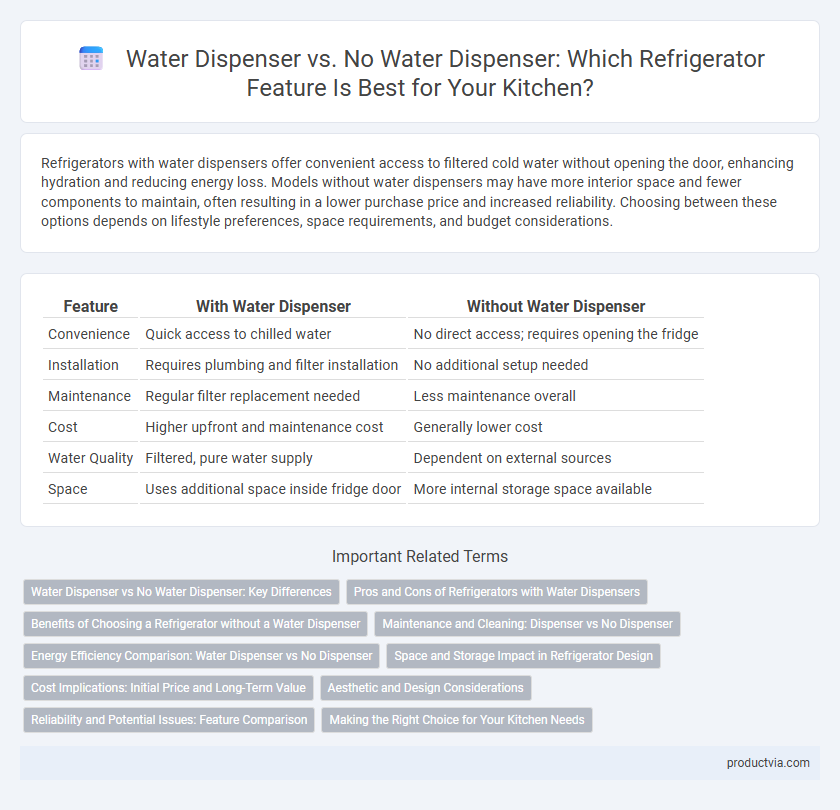Refrigerators with water dispensers offer convenient access to filtered cold water without opening the door, enhancing hydration and reducing energy loss. Models without water dispensers may have more interior space and fewer components to maintain, often resulting in a lower purchase price and increased reliability. Choosing between these options depends on lifestyle preferences, space requirements, and budget considerations.
Table of Comparison
| Feature | With Water Dispenser | Without Water Dispenser |
|---|---|---|
| Convenience | Quick access to chilled water | No direct access; requires opening the fridge |
| Installation | Requires plumbing and filter installation | No additional setup needed |
| Maintenance | Regular filter replacement needed | Less maintenance overall |
| Cost | Higher upfront and maintenance cost | Generally lower cost |
| Water Quality | Filtered, pure water supply | Dependent on external sources |
| Space | Uses additional space inside fridge door | More internal storage space available |
Water Dispenser vs No Water Dispenser: Key Differences
Water dispensers in refrigerators provide instant access to chilled, filtered water, enhancing convenience and promoting hydration without needing to open the fridge door. Refrigerators without water dispensers often have more internal storage space and lower purchase and maintenance costs but lack the added functionality of on-demand water. Choosing between the two depends on lifestyle needs, space considerations, and preferences for features such as filtration systems and ease of access.
Pros and Cons of Refrigerators with Water Dispensers
Refrigerators with water dispensers provide convenient access to chilled water without opening the door, promoting energy efficiency and hydration. However, these models may require regular filter changes and can occupy additional space on the door, potentially reducing internal storage capacity. While the built-in dispenser adds a modern touch and user comfort, it may also increase the initial cost and maintenance requirements compared to models without this feature.
Benefits of Choosing a Refrigerator without a Water Dispenser
Refrigerators without water dispensers offer increased internal storage space and fewer mechanical components, leading to enhanced reliability and easier maintenance. These models reduce the risk of water leaks and minimize energy consumption by eliminating the dispenser's cooling system. Homeowners benefit from simplified cleaning processes and a sleeker door design, maximizing usable storage capacity and overall efficiency.
Maintenance and Cleaning: Dispenser vs No Dispenser
Refrigerators with water dispensers require regular cleaning to prevent mold and bacteria buildup in the dispenser and internal water lines, increasing maintenance efforts compared to models without dispensers. Without a water dispenser, cleaning is simplified to standard interior surfaces, avoiding the need to sanitize extra components. Choosing a refrigerator without a water dispenser reduces maintenance time and potential issues related to water line leaks or dispenser malfunctions.
Energy Efficiency Comparison: Water Dispenser vs No Dispenser
Refrigerators with water dispensers typically consume more energy due to the added compressor and water cooling mechanisms required to maintain cold water flow. Models without water dispensers generally have lower energy consumption as they lack these additional components, resulting in higher energy efficiency ratings. Choosing a refrigerator without a water dispenser can reduce electricity usage by up to 10-15%, contributing to lower utility bills and a smaller environmental footprint.
Space and Storage Impact in Refrigerator Design
Refrigerators with water dispensers often require additional interior space, which can reduce overall storage capacity and limit shelf adjustments. Models without water dispensers maximize available space for food storage and flexible compartment configurations, benefiting users who prioritize storage over built-in water access. Choosing between a water dispenser and increased storage depends on balancing convenience with the need for optimized interior volume.
Cost Implications: Initial Price and Long-Term Value
Refrigerators with water dispensers typically have a higher initial price due to added plumbing and filtration features, increasing upfront costs by 10-20% compared to models without dispensers. Long-term value is influenced by maintenance expenses such as filter replacements and potential repairs, which can add $50-$100 annually. Conversely, refrigerators without water dispensers offer lower purchase prices and reduced maintenance costs, but may sacrifice convenience and hydration accessibility for some users.
Aesthetic and Design Considerations
Refrigerators with water dispensers often feature a sleek, modern design that integrates convenience with aesthetic appeal but may add bulk or interrupt a smooth front surface, disrupting minimalist kitchen layouts. Models without water dispensers offer cleaner lines, a more streamlined look, and enhanced flexibility in door design, appealing to those prioritizing simplicity and uniformity in their kitchen decor. Choosing between these options depends on balancing the desire for functional accessibility with the visual harmony of the kitchen space.
Reliability and Potential Issues: Feature Comparison
Refrigerators with water dispensers offer convenient access to chilled water but may face reliability issues such as leaks, clogged filters, and mechanical failures requiring regular maintenance. Models without water dispensers eliminate these potential problems, enhancing overall durability and reducing repair costs. Choosing a refrigerator depends on whether convenience outweighs the risk of additional component malfunctions.
Making the Right Choice for Your Kitchen Needs
Choosing a refrigerator with a water dispenser offers convenience and instant access to filtered water, enhancing hydration while reducing plastic waste. Refrigerators without water dispensers provide more interior space and fewer maintenance concerns, making them ideal for compact kitchens or those prioritizing storage capacity. Assess your kitchen habits, space availability, and maintenance preference to make the best decision tailored to your lifestyle and hydration needs.
Water Dispenser vs No Water Dispenser for Refrigerator Features Infographic

 productvia.com
productvia.com